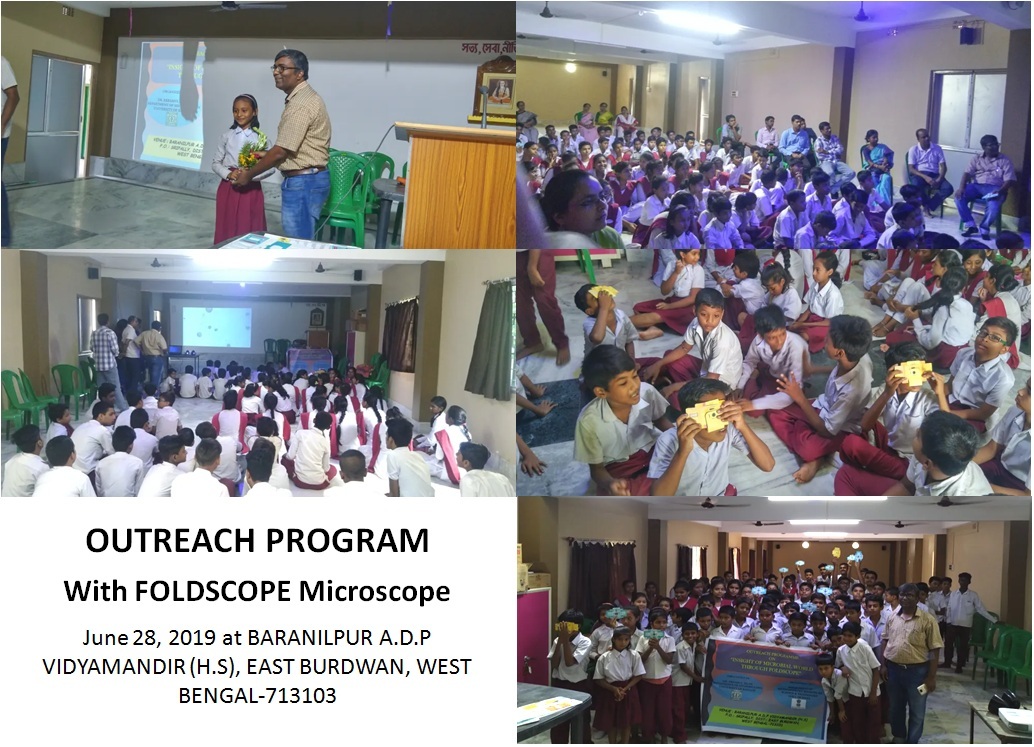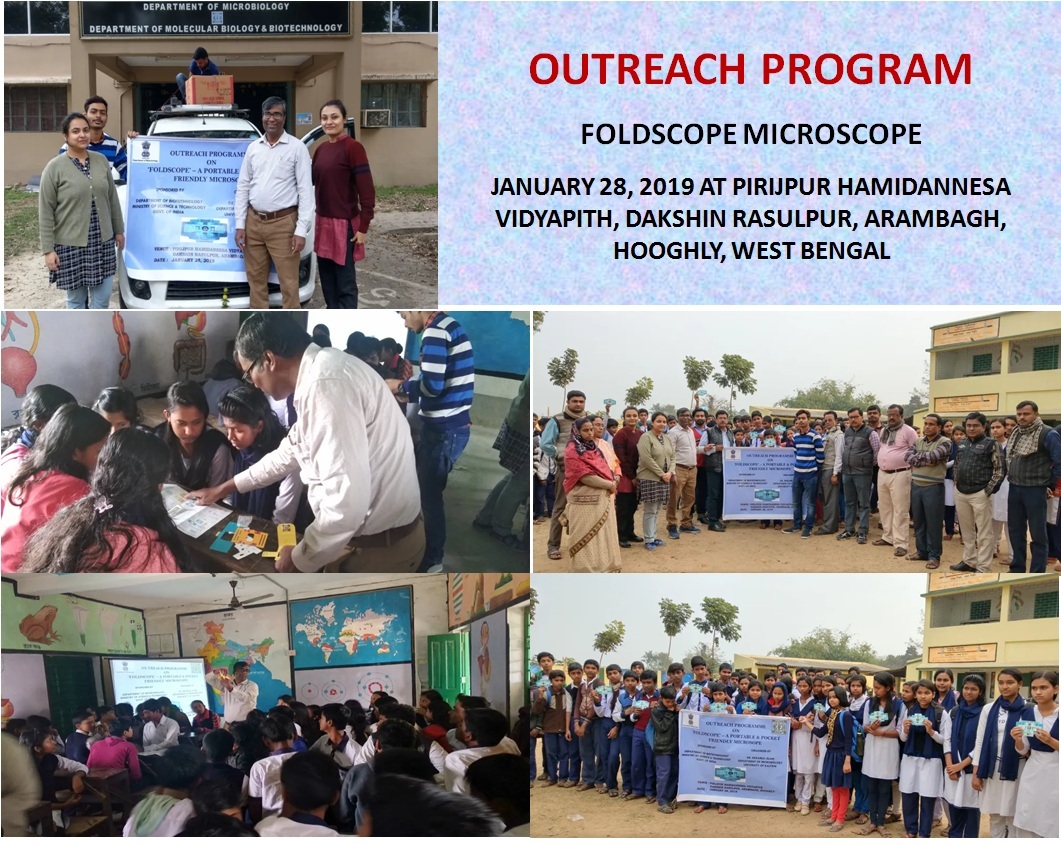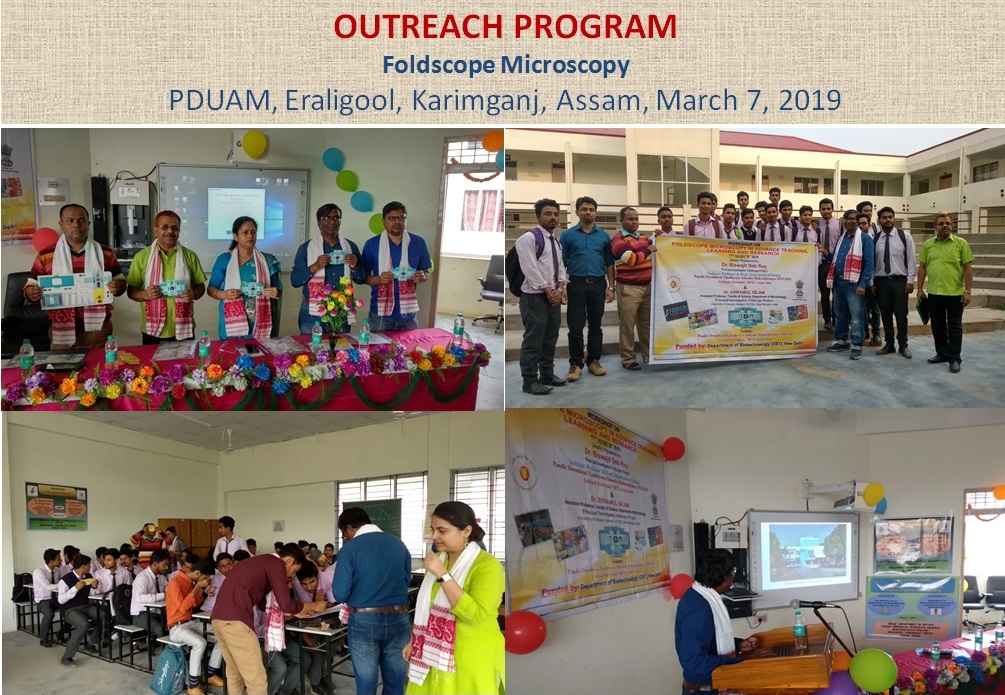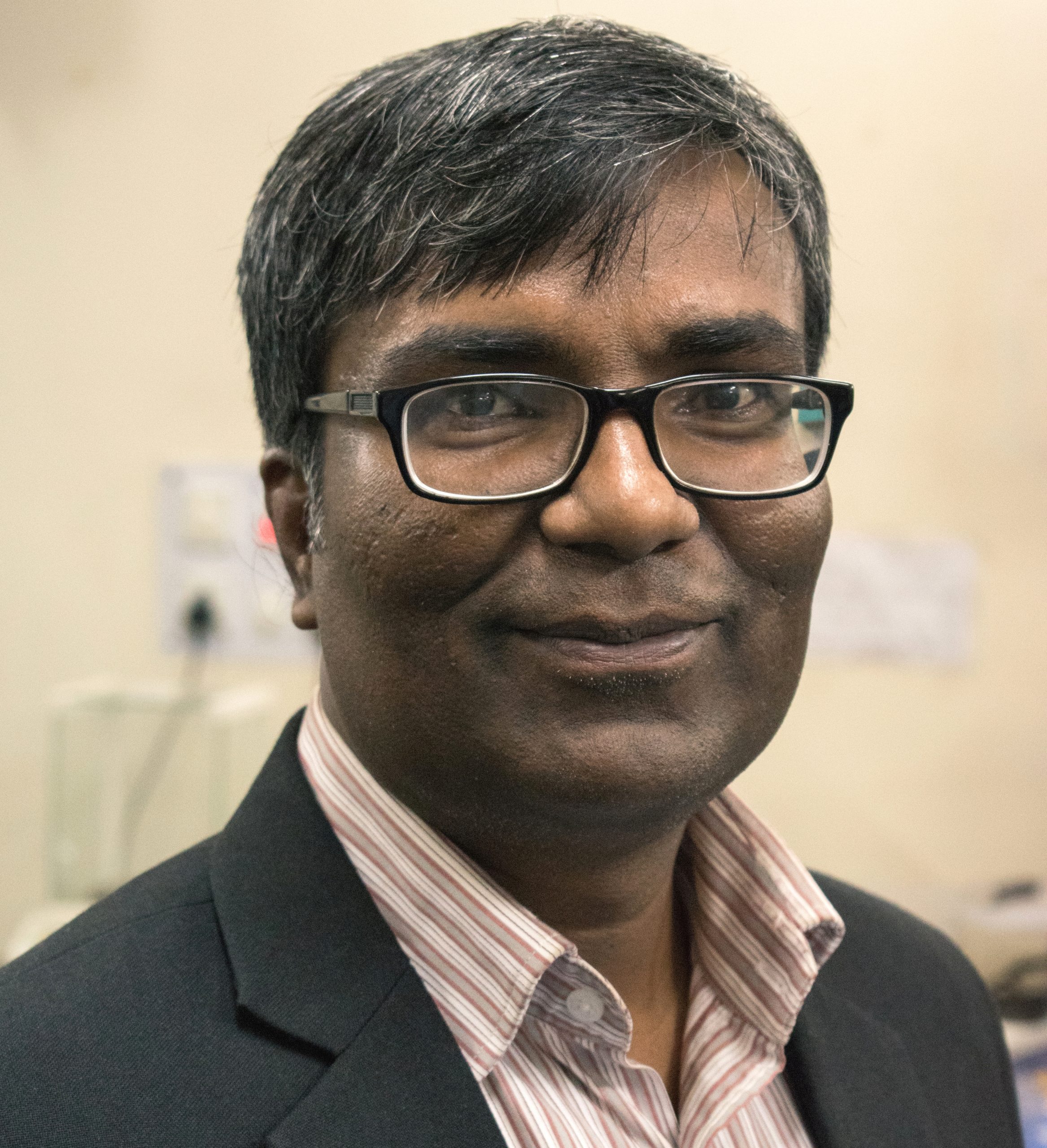
Dr. Ekramul Islam
Assistant Professor, Associate Professor
Department: Department of MicrobiologyPhone Number: 8902261685
Institutional E-Mail: ekramul@klyuniv.ac.in
Web URL: NA..
Educational Qualifications:
Ph.D.: 2012: Biotechnology: Department of Biotechnology, IIT-Kharagpur, India
Broad research area: Environmental Microbiology and Biotechnology
Ph.D. Dissertation: Molecular analysis of microbial diversity in uranium mines and indigenous bacterial interaction with uranium.
M.Tech: 2005: Biotechnology: Department of life science & Biotechnology, Jadavpur University, India;
Specialization: Pharmaceutical and Medical Biotechnology
M.Tech dissertation: Immunostimulatory effect of Leishmanial lipoprotein on macrophage cell line (RAW 264.7).
M.Sc.: 2002: Zoology: Department of Zoology, The University of Burdwan, India
Specialization: Environmental Biology
B.Sc.: 2000: Zoology (Hons): Department of Zoology, Sreegopal Banerjee College, The University of Burdwan, India.
2007-2011: Senior Research Fellow, Council of Scientific and Industrial Research (CSIR), India
2005-2007: Junior Research Fellow, Council of Scientific and Industrial Research (CSIR), India
2004: Qualified National Eligibility Test (NET) in Life Sciences (Jointly organized by CSIR and University Grant Commission, India)
–
Research Area:Microbial Community Management and Bioprospecting, Molecular Microbial ecology, Microbial Biotechnology, Metagenomics and Metatranscriptomics, Biogeochemistry, Bioremediation, Membrane Biofilm Reactor
Research Overview:
I am very keen to explore the unseen microbial world and want to exploit the huge microbial metabolic repertoire to solve the energy crisis and restore the degraded environment in a sustainable way and to human health benefit. I usually work at the interface of fundamental and applied sciences with metagenomics, combining molecular microbial ecology, environmental biotechnology, and biogeochemistry and applying the fundamental findings to solve real-world problems. The present research is focused to understand the roles of microbes in natural and polluted environments, exploitation of microbes in water treatment, and micronutrient mobilization in agricultural soil. Major objectives include linking microbial taxa, their functional attributes, and community structure to critical ecosystem processes and developing various microbial community management strategies.
TEACHING AND RESEARCH EXPERIENCE:
2024 (Sept)-Present: Associate Professor, Department of Microbiology, University of Kalyani
2012 (Sept)-2024 (Sept): Assistant Professor, Department of Microbiology, University of Kalyani
2012 (Mar)-(Sept): Research Associate, Department of Microbiology, University of Kalyani
2011 (Jul)-(Dec) Assistant Professor, The ICFAI University Tripura
1. Member of PGBOS, Department of Microbiology, University of Kalyani
2. Member of UGBOS, Department of Microbiology, University of Kalyani
3. Member of DRC, Department of Microbiology, University of Kalyani
4. Member of CPC sub-committee, Department of Physics, University of Kalyani
5. Member of Departmental Purchase Committee, Department of Microbiology, University of Kalyani
6. Member of Governing body (University nominated), Jatindra Rajendra Mahavidyalaya, West Bengal (vide letter No. IC/064(11)/463/2016, dated 28.09.2016) -09.06.2022
7. Member of Managing Committee of Nathulal Das B.Ed. College, West Bengal (vide letter No. IC/64(155)/700/2014, dated 25.11.2014) (2014-2016).
8. Member of Managing Committee of Shyamangini Kundu College of Education, West Bengal (vide letter No. IC/64(127)/699/2014, dated 25.11.2014) (2014-2016).
9. Member of Managing Committee of St. Mary’s College Bachelor of Education and Higher Studies, West Bengal (vide letter No. IC/64(118)/697/2014, dated 25.11.2014) (2014-2016).
10. Member of Managing Committee of Seva Varati B.Ed. College, West Bengal (vide letter No. IC/64(131)/696/2014, dated 25.11.2014) (2014-2016).
11. Member of Maintenance and Buildings Repair Committee, University of Kalyani (vide letter No. R/BMR/11/2013/DP-799, dated 29.11.2013) (2013-2015).
12. Member of Central Grievance Committee, University of Kalyani (vide letter No. R/CGC/11/2013/DP-759, dated 26.11.2013) (2013-2015).
25. Basak, N., Chowdhury, A.A., Roy, T. and Islam, E., 2024. Evaluation of root plaque associated plant growth promoting Burkholderia sp. EIKU24 in metal (loid) s removal, minerals solubilization and arsenic uptake inhibition in rice seedlings. Biocatalysis and Agricultural Biotechnology, p.103236. https://doi.org/10.1016/j.bcab.2024.103236
24. Roy, T., Basak, N., Mainak, S., Das, S., Ali, S.I. and Islam, E., 2024. Burkholderia sp. EIKU21 mediated synthesis of biogenic ZnO nanoparticle–based pigment for development of antibacterial cotton fabric through nanocoating. Biomass Conversion and Biorefinery, pp.1-16. https://doi.org/10.1007/s13399-024-05694-z
23. Chowdhury, A.A., Basak, N. and Islam, E., 2023. Uranium and arsenic bioremediation potential of plastic associated multi-metal tolerant Bacillus sp. EIKU23. Journal of Hazardous Materials Letters, p.100101. https://doi.org/10.1016/j.hazl.2023.100101
22. Kiron Bhakat, Ekramul Islam & Samir Kumar Mukherjee (2023): Biosolubilized zinc from ZnO in bacterial culture supernatant enhanced seed germination, early growth, and zinc accumulation in rice (Oryza sativa L.) under hydroponic system through seed priming method, Journal of Plant Nutrition, DOI: 10.1080/01904167.2023.2262501
21. Chowdhury, A.A., Basak, N. and Islam, E., 2023. Removal of uranium from water using biofilm of uranium sensitive Methylobacterium sp. Journal of Hazardous Materials Advances, 10, p.100296. https://doi.org/10.1016/j.hazadv.2023.100296
20. Paul, S., Sen, B., Basak, N., Chakraborty, N., Bhakat, K., Das, S., Islam, E., Mondal, S., Abbas, S.J. and Ali, S.I., 2023. Zn3Sb4O6F6 and KI-Doped Zn3Sb4O6F6: A Metal Oxyfluoride System for Photocatalytic Activity, Knoevenagel Condensation, and Bacterial Disinfection. Inorganic Chemistry 62, 1032–1046. https://doi.org/10.1021/acs.inorgchem.2c04006
19. Bhakat, K., Chakraborty, A., Islam, E. 2021. Characterization of zinc solubilization potential of arsenic tolerant Burkholderia spp. isolated from rice rhizospheric soil. World J Microbiol Biotechnol. 37(3):39. https://doi.org/10.1007/s11274-021-03003-8.
18. Bhakat, K., Chakraborty, A., Islam, E. 2019. Characterization of arsenic oxidation and uranium bioremediation potential of arsenic resistant bacteria isolated from uranium ore. Environmental Science and Pollution Research, 26, 12907-12919. https://doi.org/10.1007/s11356-019-04827-6.
17. Chakraborty, A., Chowdhury, A. A., Bhakat, K., Islam, E. 2019. Elevated level of arsenic negatively influences nifH gene expression of isolated soil bacteria in culture condition as well as soil system. Environ Geochem Health, 41, 1953-1966. https://doi.org/10.1007/s10653-019-00261-2.
16. Sarkar, T., Chakraborty, A., Bhakat, K., Islam, E., 2018. Phylogenetic characterization of a soil bacterium showing antagonistic behaviour. International Journal of Emerging Technologies and Innovative Research, 5: 548-551, ISSN: 2349-5162.
15. Parai, D., Banerjee, M., Dey, P., Chakraborty, A., Islam, E., Mukherjee, S.K. 2018. Effect of reserpine on Pseudomonas aeruginosa quorum sensing mediated virulence factors and biofilm formation, Biofouling, 34:3, 320-334.
14. Chakraborty, A., Islam, E. 2018. Temporal dynamics of total and free-living nitrogen-fixing bacterial community abundance and structure in soil with and without history of arsenic contamination during a rice growing season. Environmental Science and Pollution Research. 25:4951-4962.
13. Paul, T., Chakraborty, A., Islam, E., Mukherjee, S.K. 2018. Arsenic Bioremediation Potential of Arsenite Oxidizing Micrococcus sp. KUMAs15 Isolated from Contaminated Soil of West Bengal. Pedosphre, 28: 299-310.
12. Chakraborty, A., Bhakat, K., Islam, E. 2017. Arsenic contamination in agricultural soil reduces metabolic activity of total and free-living nitrogen fixing bacteria as revealed by real time qPCR. Soil and Sediment Contamination: An International Journal, 26:7-8, 736-748, DOI: 10.1080/15320383.2017.1413637
11. Parai, D., Islam, E., Mitra, J., Mukherjee, SK.. 2017. Effect of Bacoside A on growth and biofilm formation by Staphylococcus aureus and Pseudomonas aeruginosa, Canadian Journal of Microbiology. 63(2): 169-178
10. Islam, E., Sar, P., 2016. Diversity, metal resistance and uranium sequestration abilities of bacteria from uranium ore deposit in deep earth stratum. Ecotox. Environ. Safe. 127, 12–21.
9. Sarkar, A., Sar, P., Islam, E., 2016. Hexavalent Chromium Reduction by Microbacterium oleivorans A1: A Possible Mechanism of Chromate -Detoxification and –Bioremediation. Recent. Pat. Biotechnol. 9, 116-29.
8. Mallick, I., Islam, E., Mukherjee., S.K., 2015. Fundamentals and application potential of arsenic resistant bacteria for bioremediation in rhizosphere: a review. Soil Sediment Contam. 24, 704–718.
7. Islam, E., Paul, D., Sar, P., 2014. Microbial Diversity in Uranium Deposits from Jaduguda and Bagjata Uranium Mines, India as revealed by clone library and Denaturing Gradient Gel Electrophoresis analyses. Geomicrobiol. J. 31, 862–874.
6. Choudhary, S., Islam, E., Kazy, S.K., Sar, P., 2012. Uranium and other heavy metal resistance and accumulation in bacteria isolated from uranium mine wastes. J Environ Sci Health A Tox Hazard Subst. Environ. Eng. 47, 622–637.
5. Islam, E., Sar, P., 2011. Molecular assessment on impact of uranium ore contamination in soil bacterial diversity. Int. Biodeter. Biodegr. 65, 1043–1051.
4. Islam, E., Sar, P., 2011 Culture -dependent and -independent molecular analysis of bacterial community within uranium ore. J. Basic. Microbiol. 51, 372–384.
3. Islam, E., Dhal, P.K., Kazy, S.K., Sar, P., 2011. Molecular analysis of bacterial communities in uranium ores and surrounding soils from Banduhurang open cast uranium mine, India: a comparative study. J. Environ. Sci. Health. A Tox Hazard Subst Environ Eng. 46, 271–280.
2. Dhal, P.K., Islam, E., Kazy, S.K., Sar, P., 2011. Culture-independent molecular analysis of bacterial diversity in uranium-ore/-mine waste-contaminated and non-contaminated sites from uranium mines. 3Biotech. 1, 261–272.
1. Sar, P., Dhal, P.K., Islam, E., Kazy, SK., 2007. Molecular analysis of microbial community structure and diversity in contaminated and non contaminated sites of uranium mine area at Jaduguda, India. Adv. Mat. Res. 20–21, 413–416.
11. Basak, N., Chowdhury, A. A. Roy, T. and Islam, E.,2023. Diversity and distribution of ammonia-oxidizing archaea in engineered and natural environments, In Shah M, P. Eds. Anaerobic Ammonium Oxidation: For Industrial Wastewater Treatment. Walter de Gruyter GmbH & Co KG, 3, p.15.
10. Chowdhury, A. A. and Islam, E., 2023. Current Advances in Bio-Membrane Technology for Wastewater Treatment. In Shah M, P. Eds. Membrane and Membrane-Based Processes for Wastewater Treatment,. CRC Press. https://doi.org/10.1201/9781003165019, pp.35-49
9. Chowdhury, A.A., Basak, N., Roy, T. Islam, E., 2022. The language of gram-positive and gram-negative bacteria. In Shah M, P. Eds. Environmental Microbiology: Emerging Technologies, ISBN: 9783110727227, De Gruyter, GmbH, p325-339
8. Chowdhury, A.A., Basak, N. and Islam, E., 2021. Integration of bacterial and algal repertoire in the removal of heavy metals from wastewater. In New Trends in Removal of Heavy Metals from Industrial Wastewater (pp. 375-402). Elsevier.metabolic
7. Islam, E. 2021, Meta-omics studies of microbial communities in hollow fiber membrane biofilm reactors treating contaminants in water resources: recent advances, In Maulin Shah, M.P., Sarkar, A., Mandal, S., Wastewater Treatment, Cutting-Edge Molecular Tools, Techniques and Applied Aspects, Elsevier, Pages 457-470, ISBN: 9780128218815, https://doi.org/10.1016/B978-0-12-821881-5.00022-2.
6. Islam, E., Bhakat, K. 2021. Insights into the Structure, Function, and Dynamics of Rice Root and Rhizosphere-Associated Microbiome, Microbiome-Host Interactions. ISBN: 9780367479909, CRC Press
5. Islam, E., Karmakar, M.M., Bhakat, K.., 2019. Composting: Exploitation of microbial metabolic diversity therein. In Bikas Ranjan Pati and Mandal SM (eds), Recent Trends in Composting Technology, I.K. International Publishing House Pvt. Ltd., New Delhi. ISBN: 978-93-86768-31-5
4. Islam, E., Chakraborty, A., Mukherjee, S.K., 2017. Microbial Bioleaching: An Approach Leading to Recovery of Metals From Industrial Waste. In Kumar, P., Gurjar, BR., and Govil, J. N. (eds), Environ. Sci. & Engg. Vol. 8: Biodegradation and Bioremediation, Studium Press LLC, USA, p221. ISBN : 1-62699-096-4
3. Islam, E., Mukherjee, S.K., 2017. Role of various microbial enzymes in bioremediation In Kumar, P., Gurjar, BR., Tomar, S.,. Govil, J. N. (eds), Environmental Pollution: Biodegradation and Bioremediation, Studium Press LLC, USA). p58, ISBN : 1-62699-101-4
2. Sinha, S., Islam, E., Bhakat, K., Mukherjee, S.K. 2016. An insight of microbe assisted bioremediation technologies for the amendment of toxic metal contaminated sites. In Das, S. and Dash, H.R. (eds), ‘Metal-Microbe Interactions and Bioremediation: Principles and Applications for Toxic Metals’, CRC Press. p55, ISBN 9781498762427
1. Sar, P., Islam, E., 2012. Metagenomics approaches in microbial bioremediation of metals and radionuclides In T. Satyanarayana et al. (eds.), Microorganisms in Environmental Management:Microbes and Environment, DOI 10.1007/978-94-007-2229-3_23, © Springer Science+Business Media B.V. p525–546. ISBN 978-94-007-2228-6
6) Invited speaker, National Science Day, February 28, 2024, Barrakpore Rastraguru Surendranath College, Barrackpore, Kolkata-700120
5) Invited speaker, International Conference on Bioprocess for Sustainable Environment and Energy ICBSEE-2020 March 5-7, 2020, Organized by: Department of Biotechnology and Medical Engineering NIT Rourkela- 769008
4) Convened over the proceedings of Scientific Session III in the ‘International Seminar on Current Avenues in Microbial & Plant Sciences (CAMPS)’ 2019, February 23-24, 2019, Depatment of Botany, University of Gour Banga, WB.
3. Keynote speaker, ‘Foldscope microscopy in advance teaching, learning and research’ organised by Department of Botany PDUAM, Eraligool, Karimganj, Assam, March 7, 2019 (Organiser)
3) Invited Speaker, Two day symposium on Advanced Techniques of Biotechnology: Applications and Prospects. February 27th 2018. Department of Biotechnology, Techno India University West Bengal, India
2) Invited Speaker, National Seminar on Frontiers in Cell Biotogy & Microbiology. March 31, 2017. Raiganj University, WB.
1) Invited Speaker College level seminar organized by Department of Microbiology, Kanchrapara College April 8, 2016. WB.
| Sl. No | Grant Agency | Title of The Project | Duration / Tenure | Total Cost of The Project |
|---|---|---|---|---|
| 1 |
UGC-BSR-start-up grant |
Study of microbial diversity in chromium contaminated soil through metagenomic and cultivation dependent approaches for the development of suitable hexavalent chromium bioremediation strategy |
Two years (2014-2016) |
6 lakhs |
| 2 |
DST-SERB, Extramural research grant. Govt. of India |
Geomicrobiological investigation of arsenic contaminated rice rhizosphere focusing arsenic oxidizing and zinc mobilizing microbial community and development of biofertilizer for reduced translocation of arsenic and enhance acquisition of zinc in rice plant |
Three years (2017-2020) |
36 lakhs |
| 3 |
DST, Water Technology Initiatives, Govt. of India |
Evaluation and optimization of uranium removal from groundwater by reductive precipitation with the H2-based membrane biofilm reactor. |
Three years (2016-2020) |
50 lakhs |
| 4 |
DBT, Govt. of India |
To understand the wastewater fed microalgae associated microbial community using foldscope microscope. |
One years (2018-2020) |
8 lakhs |
Nil
Membership of Learned SocietiesLife member-Association of Microbiologist, India (Membership No. 3192-2012)
ORCID ID https://orcid.org/0000-0001-9033-1732SCOPUS ID https://www.scopus.com/authid/detail.uri?authorId=57742108600
Google Scholar ID https://scholar.google.com/citations?user=UDm7CjQAAAAJ&hl=en
VIAF ID -
Notable Activities
EVENT MANAGEMENT:
1. Coordinator: Seven days workshop cum training program on ‘Drinking Water Quality Analysis with Relation to Public Health’ supported by RUSA Component 10 (Entrepreneurship & Career Hub), University of Kalyani, March 23 -29, 2022.
2. Joint Convener: DST-PURSE Sponsored One Day Special Seminar on ‘Frontiers of Research in Microbiology’. Date of the seminar: March 17, 2016, Venue of the seminar: Vidyasagar Savagriha, University of Kalyani.
3. Joint Convener: DST-PURSE Sponsored One Day Special Seminar on ‘Recent Trends of Research in Molecular Biology’. Date of the seminar: March 28, 2016, Venue of the seminar: Vidyasagar Savagriha, University of Kalyani.
4. Acted as resource person to deliver talk and practical demonstration of the topic “Metagenomics & allied studies” on Dec 30, 2017 in the In-service course for PGT (Biotechnology) organised by University of Kalyani in association with KVS, MHRD, Govt. of India.
OUTREACH PROGRAM:
1. ‘Outreach program on ‘Use of foldscope, a paper microscope;’ Dr. Ekramul Islam, Baranilpur Acharya Durgaprasanna Vidyamandir (H.S), Bardhaman. June 29, 2019 (organizer)
2. ‘Outreach program on foldscope –a portable and pocket friendly microscope’ Dr. Ekramul Islam, Pirijpur Hamidannesa Vidyapith, Arambagh, Hooghly, January 28, 2019. (organiser)
3. ‘Outreach program on pocket Microscope’ Dr. Ekramul Islam, B11/12 KALYANI, NADIA, January 19, 2019. (organiser)
Nil
Research SupervisionPH.D. THESIS GUIDANCE:
1. “Molecular analysis of diversity, dynamics and activity of total and free-living nitrogen-fixing bacterial communities in arsenic contaminated agricultural soil” by Arindam Chakraborty. (awarded)
2. “Therapeutic Potentials of Bacillus sp. EIKU1 and its Metabolites” by Tonmoy Sarkar. (awarded)
3. “Characterization of Zn-mobilizing microbes in arsenic rich rice soils and their potential application” by Kiron Bhakat. (Awarded)
4. “Characterization of pigment producing microorganisms from environmental samples and bioprospecting of their pigments” by Taniya Roy. (registered)
5. “Prospects of bacteria from environmental samples in remediation of hazardous elements and their synergistic benefits” by Chowdhury Atif Aziz. (Awarded)
6. “Essential element mobilization and heavy metal bioremediation potential of rice root plaque associated bacteria” by Nilendu Basak. (registered)
UG AND PG PROJECTS GUIDED:
1. ‘Pigment Production by Zinc Solubilizing Bacteria and their Anti-Microbial Potential’ by Anindita Das, 2018-19, Department of Life Science and Biotechnology, Jadavpur University (PG)
2. ‘Zinc Solubilization by rice root plaque bacteria in aerobic and anaerobic condition’ by Meri Khatoon, Vidyasagar University, Midnapore.
3. “Antibacterial effect of extracellular metabolites produced by two zinc solubilizing bacteria” by Debasmita Modak, 2019, IISER Kolkata (UG)
4. “Zinc Solubilization Potential of Rhizosphere Bacteria Isolated from Rice roots”, by Surajit Pal, 2019, Department of Microbiology, Pondicherry University
5. ‘Characterization of zinc solubilizing and plant growth promoting potential of bacteria isolated from rice root’ by Aishwarya Singha, Dept. of Microbiology, Vidyasagar University
6. ‘Characterization of arsenic resistant and antimicrobial producing bacteria form arsenic contaminated soil’ by Mr. Nazmul Alam a student of Oriental Institute of Science and technology, Vidyasagar University, Midnapore.
7. ‘Isolation of arsenic resistant bacteria form arsenic contaminated soil’ by by Saikat Acharya a student of Oriental Institute of Science and technology, Vidyasagar University.
8. ‘Hexavalent chromium reduction potential of chromium resistant tannery effluent isolates and their consortia’ by Mr. Nilendu Basak a student of Department of Microbiology, University of Kalyani, Kalyani.
| Sl. No | Name | Photo | Current Status |
|---|---|---|---|
| 1 | Rimil Murmu |
Ongoing |
|
| 2 | Susmita Mondal |
Ongoing |
|
| 3 | Nilendu Basak |

|
Awarded |
| 4 | Taniya Roy |
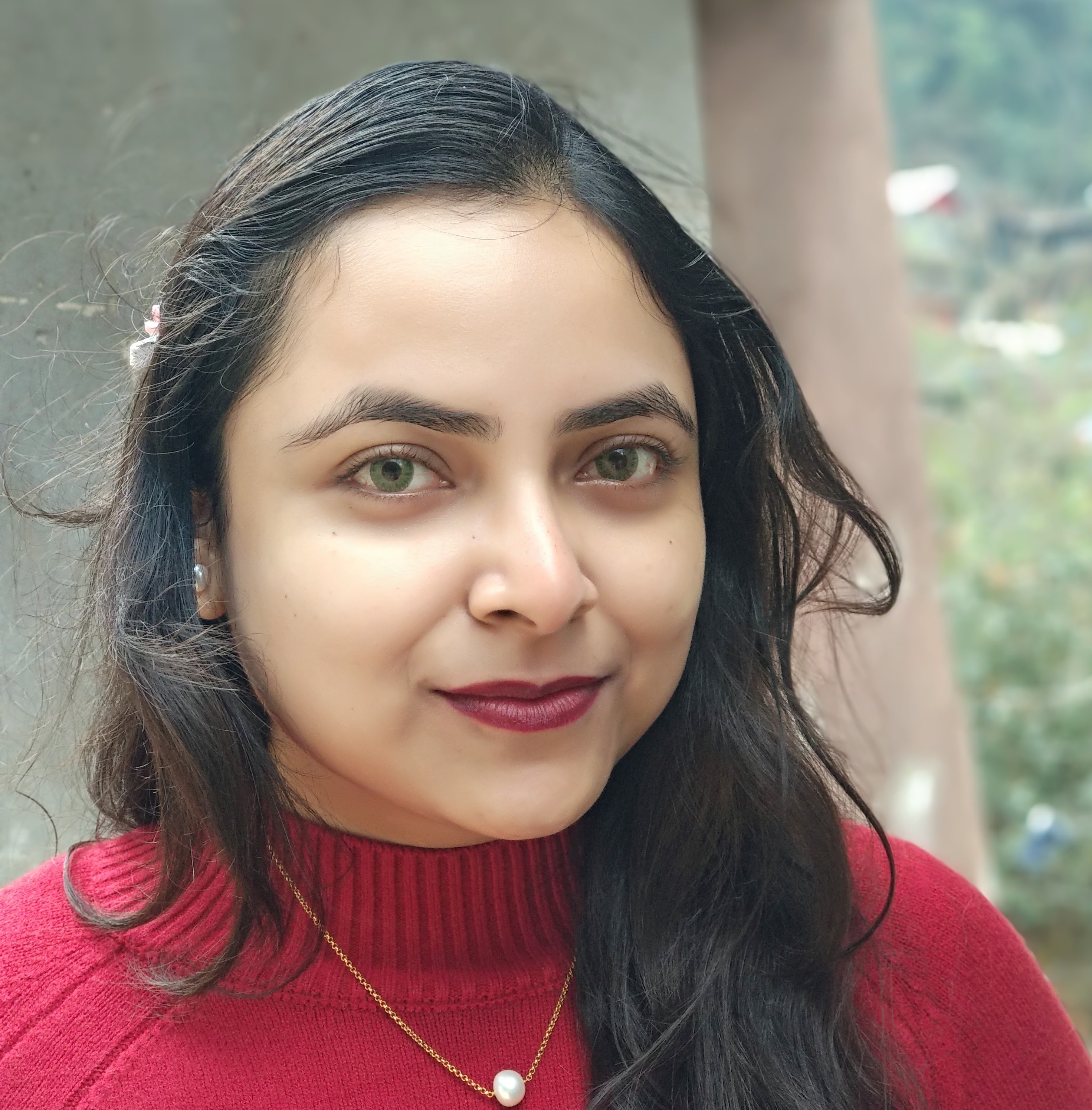
|
Awarded |
| 5 | Dr. Tonmoy Sarkar |
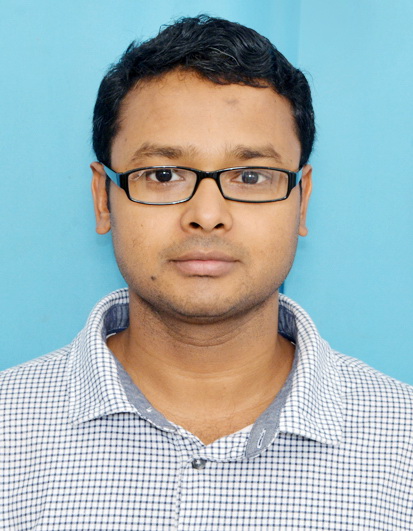
|
Awarded |
| 6 | Chowdhury Atif Aziz |

|
Awarded |
| 7 | Dr. Kiron Bhakat |
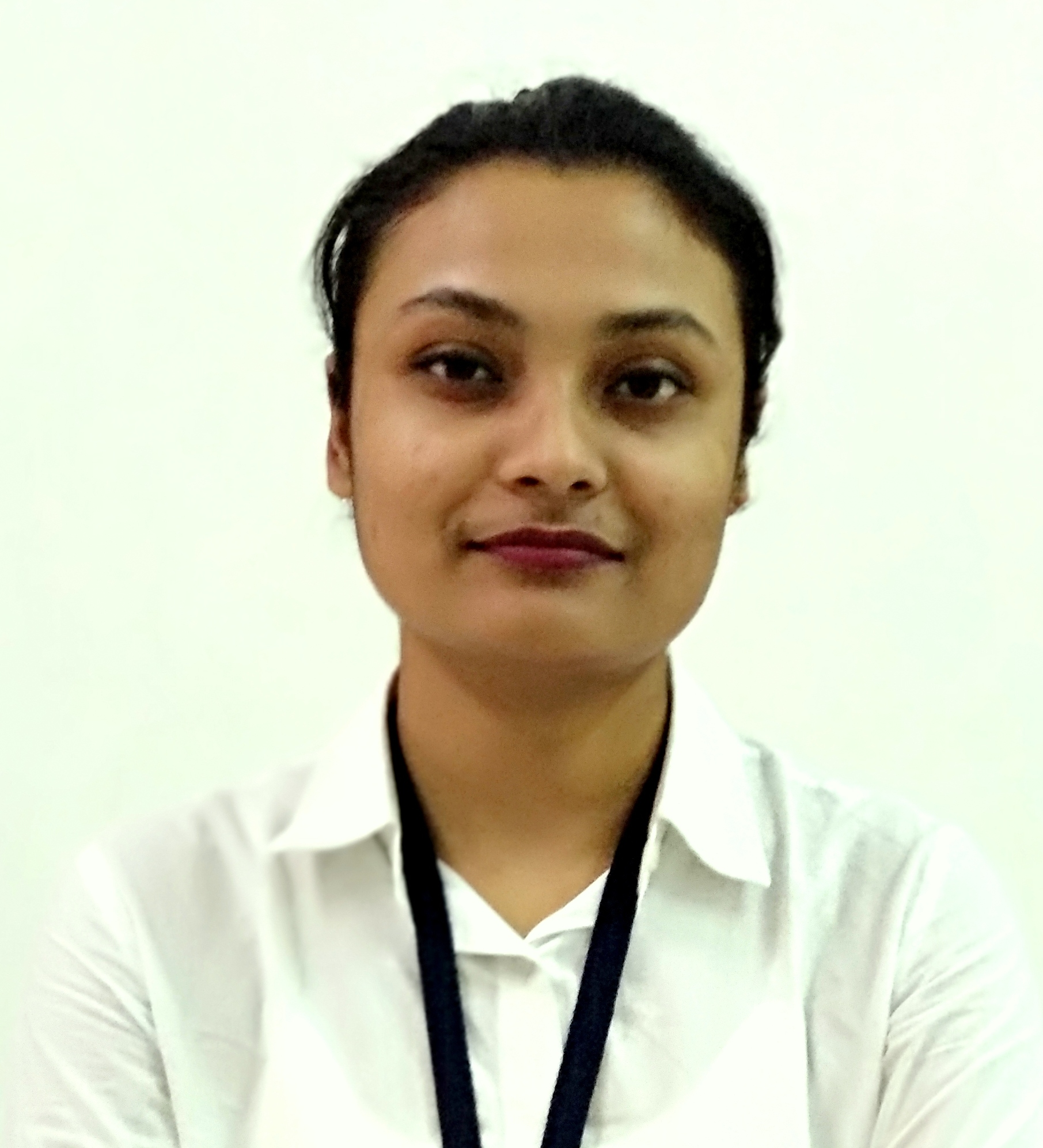
|
Awarded |
| 8 | Dr. Arindam Chakraborty |
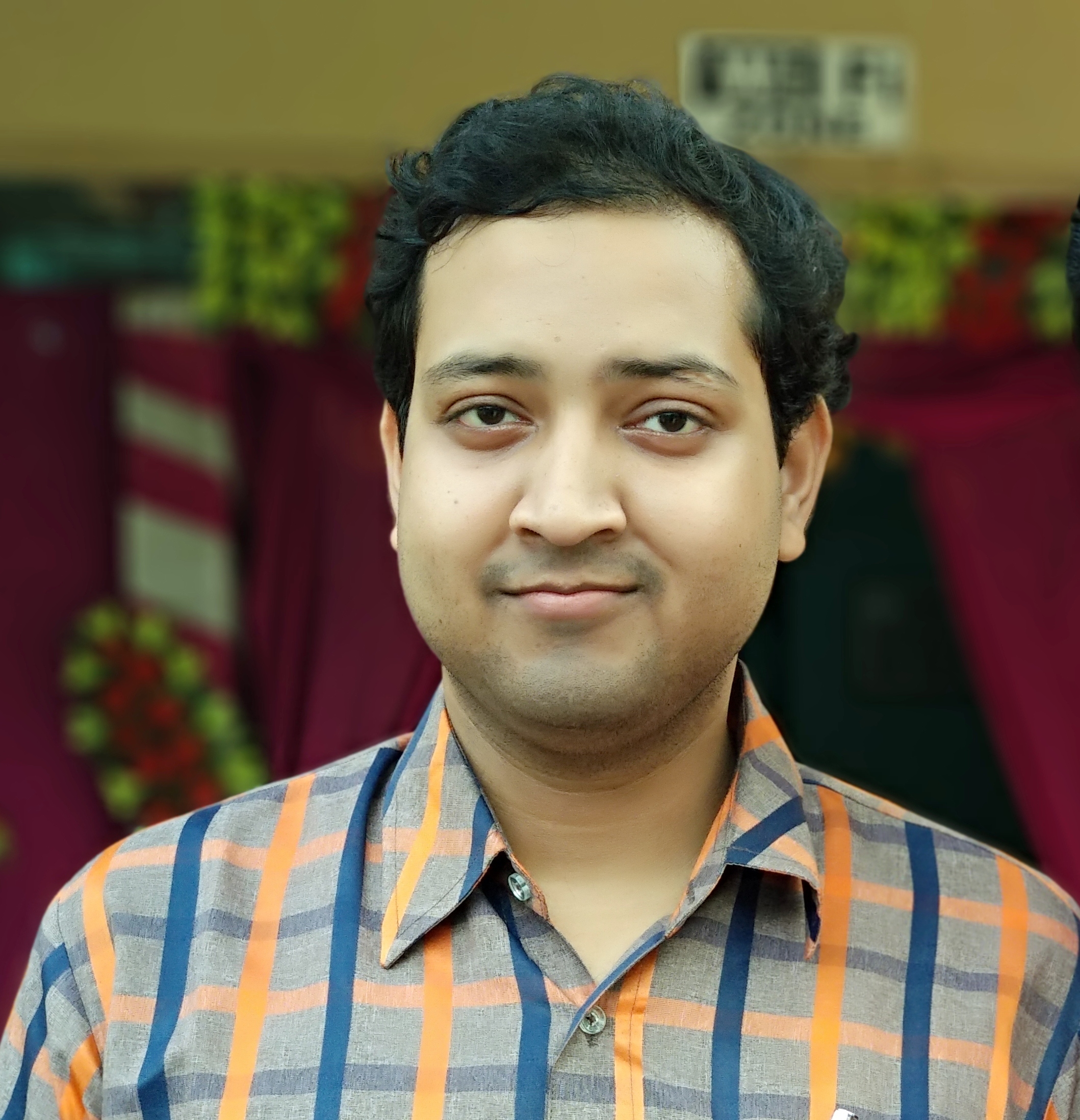
|
Awarded |
Nil


